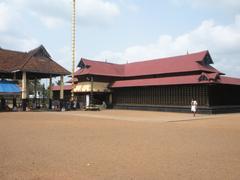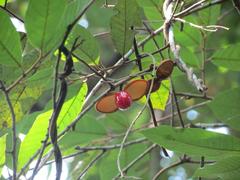Muringamangalam Sreemahadevar Temple Visiting Hours, Tickets, and Historical Significance
Date: 17/08/2024
Introduction
The Muringamangalam Sreemahadevar Temple, nestled in the serene village of Muringamangalam in Kerala, India, is a site of profound historical, architectural, and cultural importance. Dating back to the 9th century CE, the temple is dedicated to Lord Shiva and stands as a beacon of the Chera dynasty’s devotion and architectural prowess (Kerala Tourism). Characterized by its traditional Kerala architecture, the temple features intricate woodwork, stone carvings, and a copper-plated roof, making it a marvel to behold (Archaeological Survey of India).
The temple is not just an architectural gem but also a vibrant center of worship and cultural activities, especially during major festivals like Maha Shivaratri. The festival season sees an influx of thousands of pilgrims, drawn by the temple’s unique rituals and the spiritual energy that permeates its grounds. Whether you are a devout pilgrim or a curious traveler, the Muringamangalam Sreemahadevar Temple offers a rich tapestry of experiences. This guide aims to provide comprehensive information on the temple’s history, visiting hours, ticketing details, and travel tips to help you make the most of your visit.
Table of Contents
- [Introduction](#introductionintroduction)
- [History and Significance](#history-and-significancehistory-and-significance)
- [Historical Background](#historical-backgroundhistorical-background)
- [Architectural Significance](#architectural-significancearchitectural-significance)
- [Religious and Cultural Significance](#religious-and-cultural-significancereligious-and-cultural-significance)
- [Festivals and Rituals](#festivals-and-ritualsfestivals-and-rituals)
- [Maha Shivaratri](#maha-shivaratrimaha-shivaratri)
- [Thanka Anki Procession](#thanka-anki-processionthanka-anki-procession)
- [Bhagavatha Sapthaham](#bhagavatha-sapthahambhagavatha-sapthaham)
- [Monthly Auspicious Days](#monthly-auspicious-daysmonthly-auspicious-days)
- [Rituals and Offerings](#rituals-and-offeringsrituals-and-offerings)
- [Pilgrimage and Edathavalam](#pilgrimage-and-edathavalampilgrimage-and-edathavalam)
- [Visiting Hours and Tickets](#visiting-hours-and-ticketsvisiting-hours-and-tickets)
- [Travel Tips](#travel-tipstravel-tips)
- [Nearby Attractions](#nearby-attractionsnearby-attractions)
- [Accommodation](#accommodationaccommodation)
- [Food and Dining](#food-and-diningfood-and-dining)
- [Safety and Health Tips](#safety-and-health-tipssafety-and-health-tips)
- [Local Customs and Traditions](#local-customs-and-traditionslocal-customs-and-traditions)
- [Language and Communication](#language-and-communicationlanguage-and-communication)
- [Environmental Responsibility](#environmental-responsibilityenvironmental-responsibility)
- [FAQ](#faqfaq)
- [Conclusion](#conclusionconclusion)
History and Significance
Historical Background
The Muringamangalam Sreemahadevar Temple, dedicated to Lord Shiva, dates back to the early medieval period, with records suggesting its establishment around the 9th century CE. The temple’s construction is attributed to the Chera dynasty, known for their devotion to Lord Shiva and contributions to temple architecture (Kerala Tourism).
Architectural Significance
The temple exemplifies traditional Kerala temple architecture with intricate woodwork, stone carvings, and copper-plated roofing. The rectangular sanctum sanctorum (Sreekovil) houses the main deity, Lord Shiva, and is surrounded by a cloistered courtyard (Nalambalam) adorned with murals. The modest yet richly decorated gopuram and the Namaskara Mandapam with carved wooden pillars are notable features (Archaeological Survey of India).
Religious and Cultural Significance
The temple is a major center for Lord Shiva worship, attracting thousands of pilgrims, especially during the annual Maha Shivaratri festival. Unique rituals like the Thanka Anki procession and the Bhagavatha Sapthaham contribute to its religious and cultural significance (Kerala Temples Info).
Festivals and Rituals
Maha Shivaratri
One of the most significant festivals celebrated at the Muringamangalam Sreemahadevar Temple is Maha Shivaratri. This festival, dedicated to Lord Shiva, is observed with great fervor and devotion. Maha Shivaratri, which translates to “the Great Night of Shiva,” is celebrated annually in the month of February or March, depending on the lunar calendar. Devotees from all over Kerala and neighboring states flock to the temple to participate in the rituals and seek blessings from Lord Shiva (Kerala Temples Info).
During Maha Shivaratri, the temple is beautifully decorated with flowers and lights. Special poojas (rituals) and abhishekams (ceremonial bathing of the deity) are performed throughout the night. Devotees observe fasting and stay awake all night, chanting hymns and prayers dedicated to Lord Shiva. The atmosphere is charged with spiritual energy, and the temple premises resonate with the sounds of bells and conch shells.
Thanka Anki Procession
Another important event associated with the Muringamangalam Sreemahadevar Temple is the Thanka Anki procession. This sacred procession involves the transportation of the golden attire, known as Thanka Anki, which weighs 453 sovereigns, to the Sabarimala temple. The procession begins at the Aranmula Parthasarathy temple and makes an overnight stop at the Muringamangalam temple during the Mandalam-Makaravilakku pilgrimage season (Kerala Temples Info).
The Thanka Anki procession is a significant event for the devotees of Lord Ayyappa, as it symbolizes the adornment of the deity with the golden attire. The procession is accompanied by traditional music, dance, and chanting of hymns. Devotees line the route to catch a glimpse of the sacred attire and offer their prayers.
Bhagavatha Sapthaham
The Muringamangalam Sreemahadevar Temple also hosts the Bhagavatha Sapthaham, a week-long recitation of the Bhagavatham, an ancient Hindu scripture that narrates the stories of Lord Krishna. This event is organized annually and attracts a large number of devotees who come to listen to the recitations and participate in the associated rituals (Kerala Temples Info).
The Bhagavatha Sapthaham is considered a highly auspicious event, and it is believed that listening to the recitations can bring spiritual enlightenment and blessings. The temple premises are filled with the sounds of devotional songs and the recitations of the Bhagavatham, creating a serene and spiritually uplifting atmosphere.
Monthly Auspicious Days
In addition to the major festivals, the Muringamangalam Sreemahadevar Temple observes several monthly auspicious days. These days are considered highly favorable for performing specific rituals and seeking blessings from the deities (Hindu Blog). Some of the important monthly auspicious days include:
- Pradosham: Observed twice a month, Pradosham is dedicated to Lord Shiva. Special poojas and abhishekams are performed during the twilight period, which is considered highly auspicious.
- Ekadashi: Dedicated to Lord Vishnu, Ekadashi is observed twice a month. Devotees fast and offer prayers to seek the blessings of Lord Vishnu.
- Sankatahara Chaturthi: Dedicated to Lord Ganapathi, this day is observed to remove obstacles and seek prosperity. Special poojas and offerings are made to Lord Ganapathi.
Rituals and Offerings
The Muringamangalam Sreemahadevar Temple offers a variety of rituals and offerings that devotees can participate in to seek blessings and fulfill their wishes (Kerala Temples Info). Some of the main rituals and offerings include:
- Ganapathy Homam: A ritual dedicated to Lord Ganapathi, performed to remove obstacles and bring prosperity. It involves the chanting of mantras and offering of various items into the sacred fire.
- Mrithyunjaya Homam: A powerful ritual dedicated to Lord Shiva, performed to seek protection from untimely death and to promote health and longevity. The ritual involves the chanting of the Mrithyunjaya mantra and offering of various items into the sacred fire.
- Abhishekam: A ceremonial bathing of the deity with various sacred substances such as milk, honey, ghee, and water. This ritual is performed to purify and energize the deity and to seek blessings.
Pilgrimage and Edathavalam
The Muringamangalam Sreemahadevar Temple serves as an important edathavalam (resting place) for pilgrims on their way to the Sabarimala temple. During the Mandalam-Makaravilakku pilgrimage season, thousands of devotees pass through the temple and take a break to rest and offer prayers (Kerala Temples Info).
The temple provides facilities for the pilgrims, including accommodation, food, and medical assistance. The temple authorities and volunteers work tirelessly to ensure that the pilgrims have a comfortable and spiritually fulfilling experience.
Visiting Hours and Tickets
The Muringamangalam Sreemahadevar Temple is open to visitors from 4:00 AM to 12:00 PM and from 5:00 PM to 8:00 PM. Entry to the temple is free, but special poojas and rituals may require a nominal fee. It is advisable to check the temple’s official website or contact the temple authorities for the most up-to-date information on visiting hours and ticket prices (Gateway IPFS).
Travel Tips
For those planning to visit the Muringamangalam Sreemahadevar Temple during the festival seasons, here are some useful tips:
- Plan Ahead: The temple can get crowded during major festivals, so it is advisable to plan your visit in advance and make necessary arrangements for accommodation and transportation.
- Dress Modestly: As a place of worship, it is important to dress modestly and respectfully. Traditional attire is preferred.
- Follow Temple Etiquette: Observe the temple rules and regulations, such as removing footwear before entering the temple premises and maintaining silence and decorum.
- Participate in Rituals: Take the opportunity to participate in the various rituals and offerings to experience the spiritual energy and seek blessings.
- Stay Hydrated: The weather in Kerala can be hot and humid, so it is important to stay hydrated and carry water with you.
Nearby Attractions
While visiting the Muringamangalam Sreemahadevar Temple, you can also explore other nearby attractions, including:
- Aranmula Parthasarathy Temple: Known for its traditional architecture and annual boat race.
- Sabarimala Temple: A famous pilgrimage destination dedicated to Lord Ayyappa.
- Pathanamthitta: A town known for its natural beauty and cultural heritage.
Accommodation
There are several accommodation options available near the temple, ranging from budget lodges to mid-range hotels. It is advisable to book your stay in advance, especially during the peak tourist season from October to March. Some popular options include the KTDC hotels and various homestays that offer a comfortable stay with a touch of local hospitality (Kerala Taxis).
Food and Dining
Kerala is renowned for its diverse and flavorful cuisine. Visitors can enjoy traditional Kerala meals at local restaurants and eateries near the temple. Popular dishes include appam with stew, puttu with kadala curry, and various seafood delicacies. It is also recommended to try the local vegetarian fare, which is often served on banana leaves.
Safety and Health Tips
While visiting the temple, it is important to stay hydrated and wear comfortable clothing and footwear. Carry a hat or umbrella to protect yourself from the sun. It is also advisable to carry a small first-aid kit and any necessary medications. Be cautious of your belongings and avoid carrying large amounts of cash or valuables.
Local Customs and Traditions
Understanding and respecting local customs and traditions is crucial when visiting the temple. Devotees often perform circumambulation (pradakshina) around the sanctum sanctorum as a mark of reverence. It is customary to offer prayers with folded hands and bow down before the deity. Visitors should also be mindful of maintaining silence and not disturbing others during their prayers.
Language and Communication
Malayalam is the primary language spoken in Kerala. However, English and Hindi are also widely understood, especially in tourist areas. It is helpful to learn a few basic phrases in Malayalam to enhance your interaction with the locals. Most temple staff and guides are proficient in English, making it easier for international visitors to communicate.
Environmental Responsibility
Visitors are encouraged to maintain the cleanliness of the temple premises and its surroundings. Dispose of waste in designated bins and avoid littering. The temple authorities and local community place a strong emphasis on environmental conservation, and visitors are expected to adhere to these principles.
FAQ
Q: What are the Muringamangalam Sreemahadevar Temple visiting hours?
A: The temple is open from 4:00 AM to 12:00 PM and 5:00 PM to 8:00 PM. However, timings may vary on special occasions and festival days.
Q: Do I need to buy tickets to enter the temple?
A: No, there are usually no entrance tickets required to visit the temple, but donations are welcome.
Q: What is the best time to visit the temple?
A: The best time to visit is from October to March when the weather is pleasant and several Hindu festivals are celebrated.
Conclusion
The Muringamangalam Sreemahadevar Temple is not just a place of worship; it is a treasure trove of Kerala’s rich cultural and historical heritage. From its early medieval origins under the Chera dynasty to its stunning traditional Kerala architecture, the temple stands as a testament to the region’s devotion and artistic excellence. The temple’s vibrant festivals, such as Maha Shivaratri and the Thanka Anki procession, offer a unique glimpse into the cultural and religious fervor that defines Kerala.
Visitors can immerse themselves in a myriad of rituals and offerings, while also enjoying the natural beauty and nearby attractions like the Aranmula Parthasarathy Temple and the scenic Pamba River. Practical information on visiting hours, ticketing, and travel tips ensures a smooth and enriching experience.
Whether you are seeking spiritual solace or cultural enrichment, the Muringamangalam Sreemahadevar Temple promises a memorable and spiritually uplifting journey. For the latest updates and detailed information, visitors are encouraged to check the temple’s official website and follow relevant social media platforms. Plan your visit and experience the spiritual and cultural vibrancy that this sacred site has to offer.







